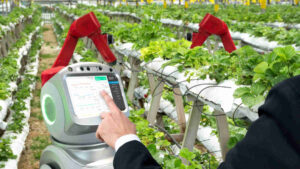Australia’s water challenges gift Roots a $66 billion market opportunity

Pic: Yuichiro Chino / Moment via Getty Images
Israeli agtech Roots Sustainable Agricultural Technologies (ASX:ROO) is in talks with several crop growers in Australia, which the company says offers up a multi-billion-dollar opportunity.
CEO Dr Sharon Devir told Stockhead several delegations had visited the company’s research facility in central Israel to see the technology in action – the most recent of which was representatives from Elders and the South Australia government.
“The Australian agricultural sector at the farm-gate is valued at $US45 billion ($66.2 billion) annually with nearly 80 per cent of produce exported to global markets,” he said.
“However, water scarcity for agriculture use is becoming an acute challenge, especially in South Australia.”
This has opened up an opportunity for Roots’ off-grid Irrigation by Condensation (IBC) technology.
The IBC off-grid system utilises humidity in the air and energy sourced from the sun or wind to irrigate crops and operates without access to electricity or a normal water supply.
Devir said Roots’ IBC technology (solar and or/electric versions) had already achieved agronomical and operational proof of concept, completing the full growth cycle of nine different crops including tomatoes, peas, spinach and sorghum.
The company is also closely watching the Australian cannabis market, which is slowly witnessing the loosening of legislation.
Roots recently proved that its proprietary Root Zone Temperature Optimization (RZTO) heating technology could increase the harvest yield on cannabis flowers by 40 per cent.
The news followed successful testing of the technology on a crop in California.
Roots’ RZTO technology utilises ground source heat exchange and/or heat pumps to heat or cool crop roots, stabilising the root temperature and reducing the impact of external weather conditions.
Devir said this leads to shortened growth cycles, increased yields and profits for farmers.
“It’s being successfully used on crops as diverse as tomatoes, strawberries, lettuce, basil, chives, cannabis, various flowers and young apricot trees,” he said.
- Subscribe to our daily newsletter
- Join our small cap Facebook group
- Follow us on Facebook or Twitter
The federal government recently made promises to cut red tape and speed up the granting of licences for Australia’s medical cannabis players.
At the same time, the Northern Territory government has gone as far as passing a Hemp Industry Bill, which introduces a licensing system for possession, cultivation, supply, processing and research of industrial hemp.
“It is good to see progress in this industry in Australia,” Devir said.
“Globally, there is a definite trend of increasing consumer demand for medical and legal recreational cannabis over the past couple of years.
“Several governments are steadily moving to regulation of the use of medical cannabis and even full legalisation.”
More than 30 countries have legalised the therapeutic use of cannabis flowers or extracts and at least a dozen more are likely to do so in coming years, according to Devir.
But countries like the US and Canada are doing it a lot quicker than Australia.
“It is recent legislative changes in the United States at State level and Canada federally that have contributed most to the current boom in the cannabis industry,” Devir said.
“In the EU, France is opening up on medical cannabis, following Germany’s legislation for medical use.
“Luxemburg recently became the first country in the EU to fully legalise cannabis for recreational use.”
Alex Keach, the boss of newly listed hemp play ECS Botanics (ASX:ECS), told Stockhead recently that Australia is missing out on “one almighty boom”.
ECS is an agribusiness and hemp food company (wholesale and retail) that backdoor listed into tech shell Axxis Technology.
Keach said the outdoor grow hemp extracts market (or CBD market) in the US is forecast to reach between $US20-25 billion by 2025.
Roots’ Devir said he expects to see similar market dynamics take hold in Australia as the company has seen in the North American and Israeli cannabis grower markets as the country loosens its cannabis laws further.
“As cannabis markets increase in size growers use our sustainable ag-tech heating and cooling solutions, which cater to the industry-wide shift towards outdoor cannabis production,” he said.
“Markets get more competitive, and growers increasingly look to adopt environmentally-friendly technologies that support healthy plant growth without the use of harmful chemicals.”
UNLOCK INSIGHTS
Discover the untold stories of emerging ASX stocks.
Daily news and expert analysis, it's free to subscribe.
By proceeding, you confirm you understand that we handle personal information in accordance with our Privacy Policy.








